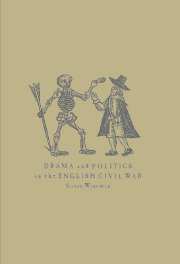Book contents
- Frontmatter
- Contents
- List of illustrations
- A note on texts and list of abbreviations
- Acknowledgements
- Preface
- Introduction: how the drama disappeared
- PART I 1642–1649: CASES IN POLITICS AND DRAMA
- Interchapter: ‘The life of action’: playing, action and discourse on performance in the 1640s
- PART II THE 1650S: PROTECTORATE, POLITICS AND PERFORMANCE
- 4 Gender and status in dramatic discourse: Margaret Cavendish, Duchess of Newcastle
- 5 Royal or reformed? The politics of court entertainment in translation and performance
- 6 National identity, topic and genre in Davenant's Protectorate opera
- 7 Genre, politics and place: the social body in the dramatic career of John Tatham
- 8 True and loyal? Politics and genre in Civil War and Protectorate tragicomedy
- Coda
- Notes
- Select bibliography
- Index
7 - Genre, politics and place: the social body in the dramatic career of John Tatham
Published online by Cambridge University Press: 20 August 2009
- Frontmatter
- Contents
- List of illustrations
- A note on texts and list of abbreviations
- Acknowledgements
- Preface
- Introduction: how the drama disappeared
- PART I 1642–1649: CASES IN POLITICS AND DRAMA
- Interchapter: ‘The life of action’: playing, action and discourse on performance in the 1640s
- PART II THE 1650S: PROTECTORATE, POLITICS AND PERFORMANCE
- 4 Gender and status in dramatic discourse: Margaret Cavendish, Duchess of Newcastle
- 5 Royal or reformed? The politics of court entertainment in translation and performance
- 6 National identity, topic and genre in Davenant's Protectorate opera
- 7 Genre, politics and place: the social body in the dramatic career of John Tatham
- 8 True and loyal? Politics and genre in Civil War and Protectorate tragicomedy
- Coda
- Notes
- Select bibliography
- Index
Summary
INTRODUCTION: 1630–1640
Louis XIV's pronouncement of 1655 – ‘L'état, c'est moi’ – could not have been made in England at the same moment. The contrast in circumstances and the effects on political thought are illuminating. Under the English republic a central question was who or what constituted the nation or body politic, and that question haunted the Protectorate. My subject here, the dramatist John Tatham, was involved in the symbolisation of the state in different ways at different moments in his career, which spans the period of Civil War and Protectorate, running from 1640 to 1664. Official policy towards theatre was transformed several times in the twentyfour years of Tatham's career, from the banning of public performance to the renewal of the lord mayors’ shows under the Protectorate and then to the new civic shows of the Restoration. The Restoration was simply the climax of the transformations which dominated his whole career.
Tatham's texts indicate the way one writer at least experienced the necessity of rethinking the political imaginary imposed by the regicide and declaration of the republic. Tatham's ‘personal’ politics are not at stake, rather the way in which genres, political circumstances and the ‘political imaginary’ of the 1650s–what could be thought, envisaged, imagined, even prophesied in political terms – shaped the way his writing and shows articulated ideas of the social body.
- Type
- Chapter
- Information
- Drama and Politics in the English Civil War , pp. 165 - 189Publisher: Cambridge University PressPrint publication year: 1998



